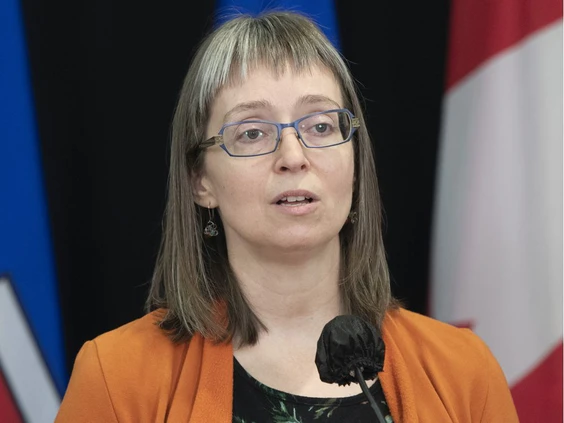Published:April 26, 2022
-Calgary Herald
Alberta’s chief medical officer of health can’t claim cabinet confidentiality to prevent divulging some of her closed-door recommendations on COVID-19 restrictions, a judge has ruled.
That ruling came amid a court proceeding whose plaintiffs are arguing Alberta’s pandemic public health orders overseen by Dr. Deena Hinshaw violated constitutional rights.
In a decision handed down Tuesday, the answers to three questions posed by Court of Queen’s Bench Justice Barbara Romaine regarding Hinshaw’s discussions with government leaders must be made public, contrary to the defence’s argument they’re protected by cabinet immunity.
“In the context of this specific evidence and this specific case, the public interest in disclosing Dr. Hinshaw’s answers to the questions posed by the court outweighs the public interest in keeping the evidence confidential,” Romaine stated in the seven-page written ruling.
“I find that, whether or not the evidence falls within the scope of public interest immunity, it is admissible as both relevant and necessary to fairly dispose of this case and to assist the Court in determining the facts upon which the decision in the case will depend.”
Romaine had asked Hinshaw if Premier Jason Kenney or cabinet members had ever directed her to impose more severe restrictions than she’d recommended, or to impose stricter measures on specific groups such as churches, gyms or small businesses against her advice.
She’d also asked Hinshaw if she ever recommended that restrictions be loosened, and if that advice had been rejected or ignored by cabinet.
Government lawyers had objected to those questions and argued entering their answers into the court record would harm the public interest by having a chilling effect on what would be discussed in future cabinet meetings.
“The precedential impact of being compelled to disclose confidential cabinet discussions in this context could impede the free flow of future cabinet discussions, thereby negatively impacting the democratic governance of the Province of Alberta,” stated Romaine’s ruling, citing an argument put forth by then-acting justice minister Sonya Savage.
She also noted the plaintiffs, which include Heights Baptist Church and Northside Baptist Church and business owners, argued withholding Hinshaw’s answers are a bid “to use this form of privilege to shield the Alberta government from allegations of political interference with respect to decisions made under the Public Health Act.”
While Romaine concluded there are instances when cabinet confidentiality is a valid tool, in this instance it is not, given the limited implications disclosure would have on governance and the importance of the case.
“The questions posed to Dr. Hinshaw and the answers she gave do not reveal disagreements among ministers or the views of individual ministers,” wrote Romaine.
“They do not reveal the specifics of her recommendations. The content of her answers thus weighs in favour of disclosure.”
Provincial government lawyers have stated they’ll appeal a ruling ordering disclosure of the answers.
It’s not known when those answers would be divulged in court.
Hinshaw has repeatedly cited cabinet confidentiality in refusing to answer reporters’ questions on what public health measures she recommended to cabinet throughout the pandemic, which began in March 2020.
She’s argued in court that her public health orders were a “last resort” necessary to protect individuals from the coronavirus and maintain the viability of the health-care system.
Hinshaw has also denied plaintiffs’ claims that measures such as masking and restrictions on public gatherings have had no effect on health.




